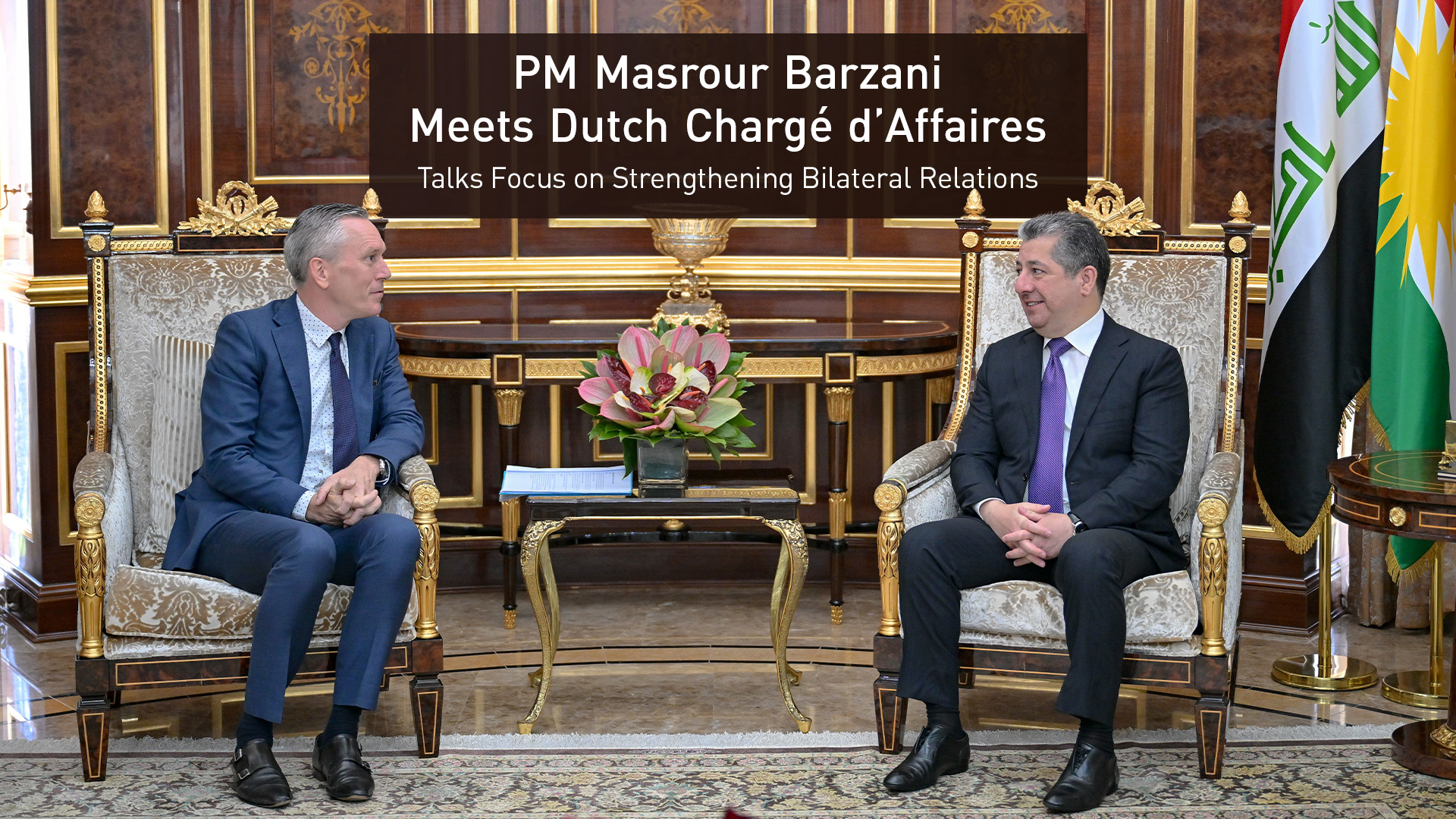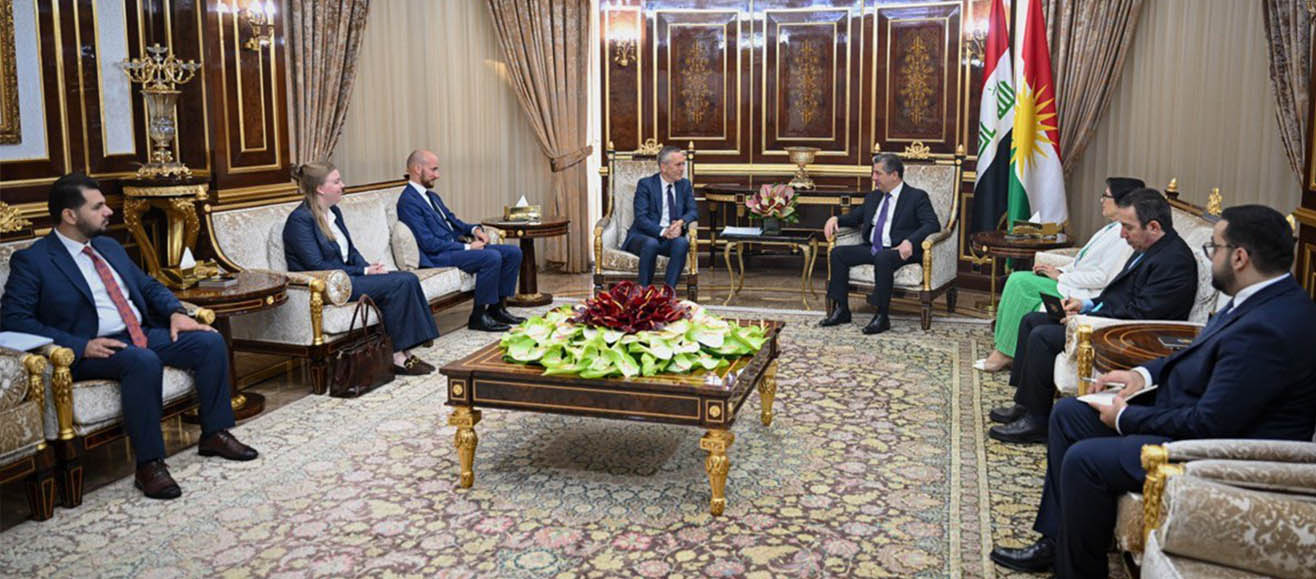Netherlands Pledges Stronger Economic Ties with Kurdistan Region, Announces Upcoming Trade Delegation
PM Barzani and the Dutch Chargé d'affaires discussed strengthening ties, with the Netherlands announcing a trade delegation to boost economic relations. The meeting highlighted a successful decade-long partnership, particularly in agriculture.

ERBIL (Kurdistan24) – In a meeting affirming the robust and expanding partnership between Erbil and Amsterdam, the government of the Netherlands has signaled its intent to further deepen economic and trade relations with the Kurdistan Region, announcing that a Dutch trade delegation is scheduled to visit in the near future. The commitment was made during a high-level discussion in Erbil on Monday, where Kurdistan Region Prime Minister Masrour Barzani met with Christoph Prommersberger, the Chargé d'affaires of the Embassy of the Kingdom of the Netherlands, to review bilateral ties and the latest regional developments.
The meeting on September 1, 2025, which was also attended by the Dutch Consul General in the Kurdistan Region, Adriaan IJsselstein, served as a platform to underscore the mutual benefits of the long-standing cooperation.
Prime Minister Barzani took the opportunity to formally thank the Netherlands for its crucial and ongoing support for the Kurdistan Regional Government's (KRG) reform agenda, particularly its contributions to the strategic goal of economic diversification.
The Prime Minister specifically highlighted Dutch support for Kurdistan's agricultural sector, an area that has become a flagship example of successful international collaboration.
In response, Chargé d'affaires Prommersberger praised the Kurdistan Region’s significant progress and development. He commended the region's well-established culture of peaceful coexistence among its diverse communities and lauded its role in providing sanctuary for a large number of displaced persons and refugees from across Iraq and neighboring countries.
Reaffirming his country's commitment, the Dutch diplomat expressed a readiness to further advance relations with the Kurdistan Region on multiple fronts. The forthcoming visit of a specialized trade delegation was presented as a concrete step in this direction, aimed specifically at developing and expanding trade and economic relations.
The discussions also encompassed the pressing political landscape, with both sides exchanging views on the efforts to form the new government cabinet in the Kurdistan Region.
They also addressed the critical importance of resolving the outstanding issues between the Kurdistan Region and the federal government in Baghdad, focusing on the need to secure the constitutional rights and financial entitlements of the people of Kurdistan.

The Prime Minister's expression of gratitude for Dutch support in agriculture is rooted in a highly successful, decade-long partnership that has produced tangible and transformative results, as previously reported by Kurdistan24.
This cooperation has been instrumental in revitalizing a key sector of the Kurdish economy and stands as a model for the KRG’s broader diversification strategy.
The most striking example of this success is in potato production. In a July 2025 interview with Kurdistan24, Dutch Consul General Adriaan IJsselstein detailed the dramatic outcomes of this joint effort. “This cooperation has been ongoing for over a decade, and we've seen strong results, going from a production of around 2,000 tons a year to over 600,000 tons now,” he stated during the unveiling of a new locally produced potato variety in Erbil.
This remarkable increase is the result of a comprehensive approach, with Dutch expertise and investment supporting the entire agricultural value chain—from providing high-quality seed potatoes to implementing modern harvesting and processing techniques.
According to the Consul General, this partnership has not only boosted production figures but has also had a profound socio-economic impact. “This project is important for the farming sector in the Kurdistan Region because it creates thousands of jobs. It contributes not only to employment, but also to food security and the potential to export to other parts of Iraq and the wider region,” IJsselstein explained to Kurdistan24.
He described the relationship as a “win-win situation,” where Dutch companies gain access to a growing market while the Kurdistan Region benefits from world-class agricultural expertise. The success in the potato sub-sector has laid the groundwork for future collaboration, with IJsselstein identifying significant potential for expansion into other areas such as vegetable and dairy production.
This agricultural collaboration is a cornerstone of a much broader and multifaceted strategic relationship.
The Netherlands views the Kurdistan Region as a key partner for stability in a volatile Middle East. In a February 2025 interview with Kurdistan24 English, Consul General IJsselstein emphasized the region's unique strategic position and its potential to enhance regional connectivity and foster economic growth.
He noted that the Kurdistan Region’s ability to maintain strong relationships with various regional actors allows it to play a constructive diplomatic role, but stressed that this requires continued political stability both internally and in its relations with Baghdad—a point that resonates with the discussions held in the Monday meeting with Prime Minister Barzani.
The political ties between the two governments are robust and marked by high-level engagement. IJsselstein previously cited meetings between Prime Minister Masrour Barzani and Dutch Prime Minister Dick Schoof, as well as a visit by the Dutch Minister of Defense to Erbil, as clear indicators of deepening ties.
However, he also emphasized that the foundation of the bilateral relationship rests on strong people-to-people connections in business, entrepreneurship, and governance.
The upcoming trade delegation announced in Monday's meeting aligns perfectly with the Netherlands' stated strategy to enhance its economic footprint in the region. The Dutch Consulate has been actively working to raise awareness among Dutch investors about opportunities in Kurdistan, organize trade missions, and provide detailed market assessments to Dutch companies.
The economic stakes are substantial. While precise figures for the Kurdistan Region are not separated, a significant portion of the Netherlands' trade with Iraq passes through its territory. In 2023, total trade between the Netherlands and Iraq amounted to €4.7 billion in imports and €1.3 billion in exports, with similar figures anticipated for 2024.
The planned delegation represents a focused effort to build on this foundation and capitalize on the stable and promising investment climate the KRG has worked to cultivate.
Therefore, the meeting between Prime Minister Barzani and the Dutch diplomatic mission was more than a routine courtesy call; it was a reaffirmation of a strategic alliance that is yielding concrete results. From the fields where potato harvests have multiplied three-hundred-fold to the high-level political corridors where strategies for regional stability are discussed, the partnership is maturing.
The announcement of a new trade delegation is the next logical step in this evolution, promising to translate a decade of successful collaboration in agriculture into broader economic prosperity and further solidifying the Kurdistan Region’s role as a reliable and dynamic partner for the Netherlands in the heart of the Middle East.